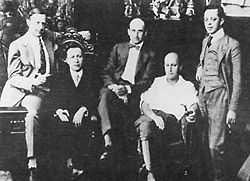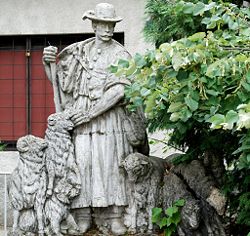Zukor, Adolph
David Doose (talk | contribs) m |
David Doose (talk | contribs) |
||
| Line 21: | Line 21: | ||
==The Early Years== | ==The Early Years== | ||
| − | + | Adolph Zukor was born to a [[Jew]]ish family in the rural village of [[Risce]], [[Hungary]]. His parents ran a small store and grew crops. Zukor did not remember his father, who died when the boy was one year old and his brother Arthur was three. Their mother was the daughter of a [[rabbi]]. She remarried, but died when Zukor was eight. | |
| − | + | The two brothers went to live with an uncle. Zukor was an unexceptional student. At the age of 12, he was apprenticed to a store owner for whom he swept, ran errands, and did chores. He attended night school twice a week. Zukor got paid nothing for his work, but received clothes and shoes from an orphans' fund. Learning of [[United States|America]] from letters sent by immigrants, Zukor decided that he wanted to travel there. In 1888, he asked the orphans' fund for money to travel to America. He received enough for a steamship ticket and $40. | |
| + | |||
| + | In 1889, at the age of 16, he emigrated to [[United States|America]]. In [[New York City]], Zukor found work as an apprentice in a fur shop for $4 a week. Zukor stayed there for two years. When he left to become a "contract" worker, sewing fur pieces and selling them himself, he was nineteen years old and an accomplished designer. But he was young and adventuresome, and the 1892 [[Columbian Exposition]] in [[Chicago]], commemorating [[Christopher Columbus]]' discovery of America, drew him to the Midwest. Once there, he started a fur business. In the second season of operation, Zukor's ''Novelty Fur Company'' expanded to twenty-five men and opened a branch. | ||
| + | |||
| + | Over the years he saved several thousand dollars. Around age 21, he returned to Hungary for a visit and saw some of [[Europe]]. He married Lottie Kaufman, also a Hungarian immigrant, in 1897. The couple had two children, Mildred and Eugene. Zukor started a fur business with his wife's uncle, Morris Kohn. | ||
| + | |||
| + | Zukor and Kohn, with two other men, also started a [[penny arcade]], complete with peep machines, a shooting gallery, punching bags, stationary bicycles, and candy. The business did very well, bringing in $500 to $700 a day. Zukor decided to get out of the fur business and devote all his time to the arcade. He worked closely with [[Marcus Loew]] at this time, becoming treasurer of his company. | ||
He became involved in the [[film|motion picture]] industry when in 1903 his cousin, Max Goldstein approached him for a loan. [[Mitchell Mark]] needed investors in order to expand his chain of similar theaters that begun in [[Buffalo, New York]] with [[Edisonia Hall]]. The arcade salon was to feature [[Thomas Edison]]'s marvels: phonographs, electric lights and moving pictures. Zukor not only gave Goldstein the money but insisted on forming a partnership to open another one. Another partner in the venture was [[Marcus Loew]]. | He became involved in the [[film|motion picture]] industry when in 1903 his cousin, Max Goldstein approached him for a loan. [[Mitchell Mark]] needed investors in order to expand his chain of similar theaters that begun in [[Buffalo, New York]] with [[Edisonia Hall]]. The arcade salon was to feature [[Thomas Edison]]'s marvels: phonographs, electric lights and moving pictures. Zukor not only gave Goldstein the money but insisted on forming a partnership to open another one. Another partner in the venture was [[Marcus Loew]]. | ||
| Line 30: | Line 36: | ||
Zukor was also an accomplished director and producer. He retired from Paramount Pictures in [[1959 in film|1959]] and thereafter assumed Chairman Emeritus status, a position he held up until his death at the age of 103 in [[Los Angeles, California|Los Angeles]]. | Zukor was also an accomplished director and producer. He retired from Paramount Pictures in [[1959 in film|1959]] and thereafter assumed Chairman Emeritus status, a position he held up until his death at the age of 103 in [[Los Angeles, California|Los Angeles]]. | ||
| + | |||
==Notes== | ==Notes== | ||
<references/> | <references/> | ||
Revision as of 18:09, 3 September 2008
| Adolph Zukor | |
| Date of birth: | January 7 1873 |
| Birth location: | Ricse, Hungary |
|---|---|
| Date of death: | June 10 1976 (aged 103) |
| Death location: | Los Angeles, California, United States |
| Academy Awards: | Academy Honorary Award 1949 Lifetime Achievement |
| Spouse: | Lottie Kaufman (1897-1956) |
Adolf Cukor (Adolph Zukor) (January 7, 1873 – June 10, 1976) was a film mogul and founder of Paramount Pictures.
Adolph Zukor, the longtime head of Paramount Pictures during its heyday, was a key figure in the development of the powerful studio system that ran Hollywood from the late '20s through the '60s. One of the very first studio moguls, Zukor's was truly a rags-to-riches story,
He was known as the "father of the feature film in America." From running penny arcades to creating Paramount Pictures Corporation, Zukor had a hand in the development of every aspect of the film industry. He worked at Paramount every day until his 100th birthday, and held the title of chairman emeritus until his death at the age of 103.
In 1948, Zukor was awarded a special Oscar for his contribution to the industry.
The Early Years
Adolph Zukor was born to a Jewish family in the rural village of Risce, Hungary. His parents ran a small store and grew crops. Zukor did not remember his father, who died when the boy was one year old and his brother Arthur was three. Their mother was the daughter of a rabbi. She remarried, but died when Zukor was eight.
The two brothers went to live with an uncle. Zukor was an unexceptional student. At the age of 12, he was apprenticed to a store owner for whom he swept, ran errands, and did chores. He attended night school twice a week. Zukor got paid nothing for his work, but received clothes and shoes from an orphans' fund. Learning of America from letters sent by immigrants, Zukor decided that he wanted to travel there. In 1888, he asked the orphans' fund for money to travel to America. He received enough for a steamship ticket and $40.
In 1889, at the age of 16, he emigrated to America. In New York City, Zukor found work as an apprentice in a fur shop for $4 a week. Zukor stayed there for two years. When he left to become a "contract" worker, sewing fur pieces and selling them himself, he was nineteen years old and an accomplished designer. But he was young and adventuresome, and the 1892 Columbian Exposition in Chicago, commemorating Christopher Columbus' discovery of America, drew him to the Midwest. Once there, he started a fur business. In the second season of operation, Zukor's Novelty Fur Company expanded to twenty-five men and opened a branch.
Over the years he saved several thousand dollars. Around age 21, he returned to Hungary for a visit and saw some of Europe. He married Lottie Kaufman, also a Hungarian immigrant, in 1897. The couple had two children, Mildred and Eugene. Zukor started a fur business with his wife's uncle, Morris Kohn.
Zukor and Kohn, with two other men, also started a penny arcade, complete with peep machines, a shooting gallery, punching bags, stationary bicycles, and candy. The business did very well, bringing in $500 to $700 a day. Zukor decided to get out of the fur business and devote all his time to the arcade. He worked closely with Marcus Loew at this time, becoming treasurer of his company.
He became involved in the motion picture industry when in 1903 his cousin, Max Goldstein approached him for a loan. Mitchell Mark needed investors in order to expand his chain of similar theaters that begun in Buffalo, New York with Edisonia Hall. The arcade salon was to feature Thomas Edison's marvels: phonographs, electric lights and moving pictures. Zukor not only gave Goldstein the money but insisted on forming a partnership to open another one. Another partner in the venture was Marcus Loew.
In 1912, Adolph Zukor established Famous Players in Famous Plays as the American distribution company for the French film production Les Amours de la reine Élisabeth starring Sarah Bernhardt. The following year he obtained the financial backing of the Frohman brothers, the powerful New York City theatre impresarios. Their primary goal was to bring noted stage actors to the screen and they created the Famous Players Film Company that produced The Prisoner of Zenda (1913). The studio evolved into Famous Players-Lasky and then Paramount Pictures, of which he served as president until 1936 when he was elevated to chairman of the board. He revolutionized the film industry by organizing production, distribution, and exhibition within a single company.
Zukor was also an accomplished director and producer. He retired from Paramount Pictures in 1959 and thereafter assumed Chairman Emeritus status, a position he held up until his death at the age of 103 in Los Angeles.
Notes
ReferencesISBN links support NWE through referral fees
- Zukor, Adolph, The Public Is Never Wrong: My 50 Years in the Picture Industry (New York: G. P. Putnam, 1953)
- Balaban, David. "The Chicago Movie Palaces of Balaban and Katz," Arcadia Publishing, 2006.
External links
- American Experience
- Krebs, Albin.Obituary, NY Times, June 11, 1976 Adolph Zukor Is Dead at 103; Built Paramount Movie Empire. Retrieved June 14, 2008.
- Adolph Zukor. Retrieved June 14, 2008.
- Theatre Historical Society of America. Retrieved June 14, 2008.
- Balaban and Katz Historical Foundation Official Website of Balaban and Katz. Photos of Balaban and Katz Theatres and corporate information. Retrieved June 14, 2008.
Credits
New World Encyclopedia writers and editors rewrote and completed the Wikipedia article in accordance with New World Encyclopedia standards. This article abides by terms of the Creative Commons CC-by-sa 3.0 License (CC-by-sa), which may be used and disseminated with proper attribution. Credit is due under the terms of this license that can reference both the New World Encyclopedia contributors and the selfless volunteer contributors of the Wikimedia Foundation. To cite this article click here for a list of acceptable citing formats.The history of earlier contributions by wikipedians is accessible to researchers here:
The history of this article since it was imported to New World Encyclopedia:
Note: Some restrictions may apply to use of individual images which are separately licensed.

